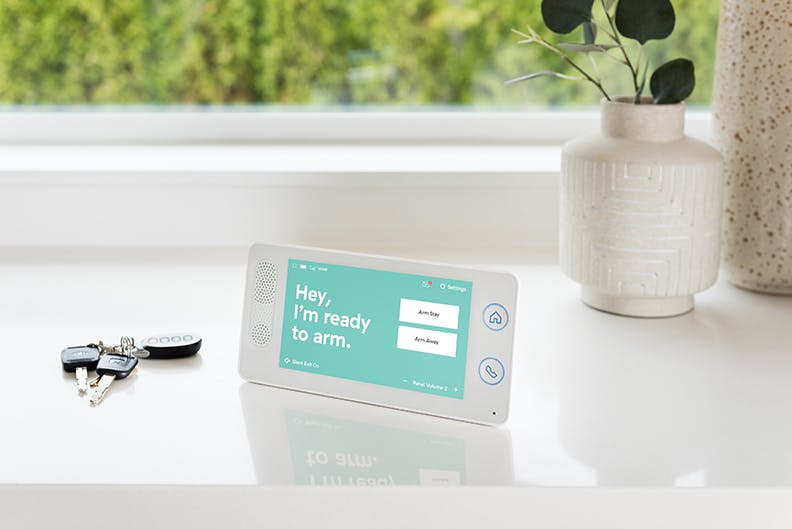
Do Homes Need to Have Security?
Answer: Although home security isn’t a requirement, security professionals highly recommend that homes employ a home security system for better protection.
Nearly every person knows someone who has been a victim of burglary. Burglaries are common in the United States—the chance of becoming a victim of burglary is one in 232 people. Every year, over two million burglaries are reported. Some reports show that burglary is increasing, while others show that burglary is decreasing. However, the simple fact remains that homes are surprisingly likely to experience a burglary, especially if the home meets the burglar’s requirements.
In 2012, UNC Charlotte published a report titled, “Understanding Decisions to Burglarize From the Offenders Perspective.” The study detailed the psyche behind burglars, explaining how and why they chose their targets. Understanding a burglar’s motives can help homeowners reduce their chances of becoming a target.
The study noted that most burglars target homes in hopes of finding prescription drugs and money. Over 51 percent of burglars listed their main reason for breaking into a home was to find drugs. Another 37 percent listed their main reason as money. Of those who listed money are their main reason, 64 percent said that they needed the money to buy drugs. This gives homeowners a general picture of who is breaking into homes. Most burglars need drugs, or they need the money to buy drugs. This makes them desperate and impulsive.

On top of that, 8 percent of burglars confessed that they had been convicted of homicide in the past, 12 percent had been convicted of armed robbery, and 7 percent had confessed to assault. This means that some burglars are dangerous and willing to go to extreme lengths in order to escape a house without being caught. If a homeowner or family member is home during a burglary, they should immediately hide and call local law enforcement.
UNC’s study also revealed what burglars look for in a home. The study says, “Close proximity of other people (including traffic, those walking nearby, neighbors, people inside the establishment, and police officers), lack of escape routes, and indicators of increased security (alarm signs, alarms, dogs inside, and outdoor cameras or other surveillance equipment) was considered by most burglars when selecting a target.” In short, this means that burglars avoid homes in active neighborhoods, homes with dogs, and homes with signs of home security. The study clarifies this point by including a list of bullet points explaining the effect of a home security system:
- Within a broad set of potential target hardening deterrents, alarms and outdoor cameras and other surveillance equipment were considered by a majority of burglars.
- About 60% of the burglars indicated that the presence of an alarm would cause them to seek an alternative target altogether.
- Most burglars would try to determine if an alarm was present before attempting a burglary.
- Among those that determined that an alarm was present after initiating a burglary, about half would discontinue the attempt.
Overall, the percentage of burglars who would burglarize a home with a home security system is about 20 percent, meaning that homes with security systems deter 80 percent of burglars. So, why do burglars avoid home security systems? What is it about a security system that scares the burglar away? Let’s look back at UNC’s study for the answer.
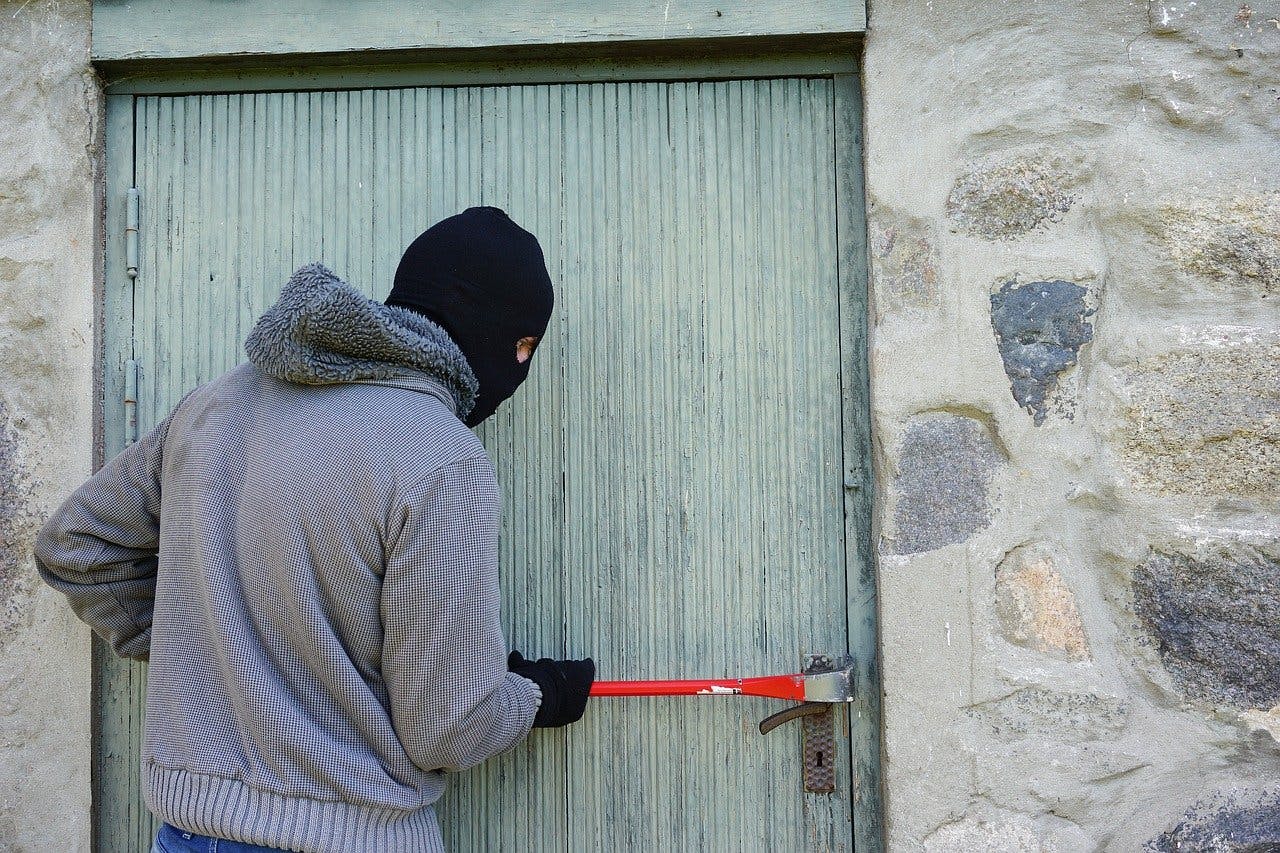
Because most burglars are looking for drugs or money, they are desperate, meaning they are more spontaneous. A spontaneous burglar is more likely to target a home that looks easy to burglarize. UNC’s study confirms this idea: “About 12% indicated that they typically planned the burglary, 41% suggested it was most often a “spur of the moment” event/offense, and the other 37% reported that it varied.” A large majority of burglars decide to burglarize a home randomly and impulsively. They see a house and think, “That home seems like an easy target,” and then they break into the house.
Burglars rarely plan the break-in. The study reveals that of the burglars who plan their burglaries, 49 percent break into the house the same day they chose the target. Another 13 percent break into the home within one and three days of choosing the target. This means that even burglars who plan the target rarely wait enough time to learn how to get around the home’s security system.
So, why would a home security system deter a burglar? Alarm systems present a challenge to burglars, while most burglars aren’t looking for a challenge. Almost all burglars are looking for an easy target. Homes that have alarm systems installed tell the burglar that the home is well-protected, monitored, and difficult to break into without alerting the neighbors and the police.
Homeowners, renters, and business owners who want to decrease their odds of ever experiencing a burglary should install a home security system. Although having home security isn’t a requirement in any state, it’s highly recommended by security professionals. Security services offer a variety of benefits that should appeal to most modern homeowners.
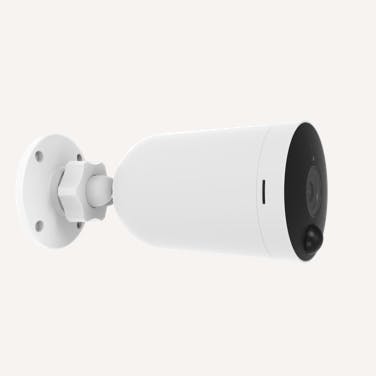
What Is “Modern Security?”
Answer: Modern security protects homeowners and their families from a wide variety of threats to their home.
When a person thinks of “home security,” they often envision cameras, sensors, smart locks, door locks, and maybe a video doorbell. The typical idea of home security is basic, offering simple protection that focuses on your home from burglary. On the other hand, modern security focuses on protecting every aspect of your life. Some security systems only offer limited protection. These systems are typically bought at the store rather than from an alarm company. They are unmonitored and provide the simple basics of security. These unmonitored systems aren’t considered modern security because they don’t offer protection for multiple aspects of a person’s life. Modern security will protect a family from threats to their home life.
Modern security may also refer to cybersecurity, cloud security, and multi factor authentication. A modern home security system will often use a secure network to transmit data and be resistant to hackers attempting to access the system through a connected device. In short, modern security refers to security products used to protect users in various capacities.
What Features Are Included In a Modern Security System?
Answer: A modern security system should include features such as professional and remote monitoring, fire and flood safety, and medical monitoring.
To be “modern security,” a home security system must meet specific requirements. Specifically, the alarm system has to protect the home from more than burglary. It must be versatile in its protection, allowing users to use the products for more than one activity. Modern security includes professional monitoring, remote monitoring, fire safety, flood protection, air quality monitoring, and medical monitoring.
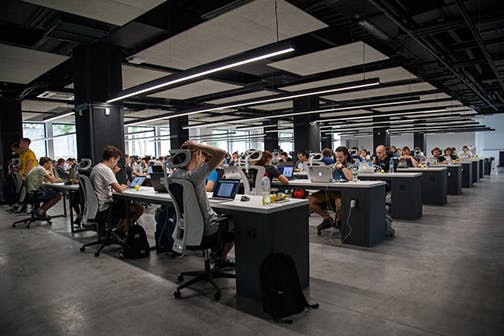
Professional Monitoring
A modern security system protects the home every hour of every day, when it’s armed, ensuring that the homeowner is always secured and safe. To do this, a modern security system offers professional monitoring. Professional monitoring is when the alarm company monitors your home automation. If an alarm triggers, the alarm company will personally check to see whether the alarm was a false alarm or if the family needs help. Within one minute, the alarm company will call the police.
Professional monitoring gives the home continuous monitoring through rotating security teams. Families are better protected when using professional monitoring because the security company is able to watch over each alarm device. The second an alarm triggers, the security company is on the phone to get a hold of the family. If the household doesn’t answer, the security company immediately contacts the police.
Professional monitoring is considered part of a modern security system because it protects from burglaries every hour of the day, regardless of whether someone is home. Other security systems that don’t include professional monitoring fall short in their protection and rarely catch the burglar. Due to the lack of professionally monitored systems, only 13 percent of burglaries are solved each year.
Remote Monitoring
To be a modern security system, the alarms must have a way to contact the homeowner of a burglary. The homeowner has invested thousands of dollars into the home and expects the home to be protected. However, many alarm systems leave the homeowner completely in the dark without the option to get alerts from the home security system. This adds unnecessary stress and ambiguity to the protection of the home. Modern home security systems should have remote monitoring to ensure peace of mind for the homeowner.
Remote monitoring means that the alarm system owner can access the alarm system remotely, typically through an app on their mobile device. The app connects with the control panel at home through a secure cellular network. With access to the control panel, the mobile app lets the user watch live streams from their indoor security camera, silence a motion sensor, arm the entire system, or disarm the alarms. Remote access doesn’t only give the homeowner peace of mind; it gives them control over their alarm.
Modern security puts the user’s needs first, meaning that it prioritizes the safety and comfort of the homeowner and the homeowner’s family. Remote access allows the homeowner to control their alarm system from a remote location, ensuring that the homeowner knows what is happening in the home while he or she is away.

Remote monitoring also offers benefits that stretch beyond protection from criminals. Homes are meant to be a safe haven for the people living in the home. This is why remote monitoring can be used to monitor situations other than burglaries. For example, pet owners often use remote monitoring to monitor their mischievous pets and to keep the pets out of trouble. Some indoor cameras have two-way voice, meaning that the pet owner can talk to their pets to soothe separation anxiety. Remote monitoring can also be used as a nanny camera or baby monitor (while the homeowner is home with the baby sleeping in another room). Modern security is flexible, allowing homeowners to use their products for a variety of purposes.
Fire Protection
Homes are threatened by more than just fire. Every year, thousands of homes are burned down due to forest fires, accidental home fires, and arson. In many homes, the family is away when the fire starts. When no one is home during a house fire, the family is safe, but the house is more at risk. The fire will burn faster and hotter with each minute that passes while the fire alarms ring, and no one hears them. When the flames burst from a window, an alarmed neighbor will finally call the fire department, but by then, the flames have already caused severe fire damage.
A modern home security system will offer a solution to this issue with a smart fire alarm. A smart fire alarm will set off an audible alarm while also contacting both the homeowner and the alarm company that a fire is burning inside the house. Smart fire alarms are better equipped to protect the home from fire than traditional alarms. Smart fire alarms are considered the modern replacement for older fire alarms. Modern alarm companies include fire protection.
Flood Protection
As we mentioned, modern security offers protection for all aspects of life. Your home security system should include protection against flooding to ensure that your home is safe. Flooding affects thousands of homes each year, resulting in extreme flooding damage and repair costs. Flooding in the home can also have severe health side effects. Water can seep into the floor and carpets, creating a humid area for mold and mildew to grow. A person living in a home with a mold and mildew infestation may experience the following symptoms:
- Runny or blocked nose
- Watery, red eyes
- Dry cough
- Skin rashes
- Sore throat
- Sinusitis
- Wheezing

These symptoms will continue for as long as there are mold spores in the home, making life miserable for those living in the mold-infested house. Mold will grow in places where it is cool, damp, and dark, making the mold infestation difficult to find.
Modern home security systems offer flood sensors to prevent serious floods from damaging the home over time. Flood sensors are meant to catch flooding early, before it has a chance to cause serious damage to the home. These sensors are small, non-evasive, and can be placed all around the home near appliances that could potentially leak. If a sensor detects a leak, the sensor will alert the alarm company of the problem.
Air Quality Monitoring
A modern security system cares about protecting your family from anything that could threaten them while inside your home. One of the most important concerns that homeowners and renters may have is carbon monoxide. Carbon monoxide is a dangerous, toxic gas that can cause headaches, nausea, fainting, unconscious, brain damage, and death. When a person breathes in carbon monoxide, the gas binds to the blood, taking the place of oxygen. Essentially, carbon monoxide suffocates a person, even when there’s plenty of air to breathe.
Carbon monoxide affects over 30,000 homes every year and results in 500 deaths. The dangerous gas is produced when a fuel-burning appliance doesn’t burn the fuel properly and creates carbon monoxide instead of carbon dioxide. Homes are required to be equipped with a carbon monoxide sensor; however, required sensors only include an alarm. When a normal carbon monoxide sensor triggers the alarm, the alarm rings and alerts those in the home that something is wrong. The problem occurs when only the children are home, or there are indoor pets home alone.
Rather than leaving children and pets unprotected from carbon monoxide poisoning, a modern carbon monoxide sensor alerts the family of the leak. As soon as the alarm triggers, the sensor sends a cellular message to the homeowner and the alarm company. If the homeowner doesn’t respond to the alarm, the alarm company will send emergency services to the house. At Cove our smoke and carbon moxide detectors are merged into one device.

Medical Emergencies
A modern alarm system needs to protect the family from every possible scenario, including medical emergencies in older adults. One in four adults above the age of 65 will fall each year, meaning that over three million older adults are treated for fall injuries. Falling at an older age is extremely dangerous since the body has a more difficult time healing, and the bones are often more fragile. When an older adult lives alone, they face the risk of falling and being unable to reach the phone. Studies show that older adults treated within the first hour of falling can continue living alone. Those who aren’t found and treated within the first hour often face serious medical repercussions and aren’t able to live alone.
A modern home security system protects the elders of our society by offering medical monitoring. A medical alert monitor is a system included in the home security system itself. It features a medical alert pendant that has a small button in the pendant. If the older adult falls and needs help, they can press the button. The medical alert pendant connects the home security system to the security team. If the older adult is close to the two-way alert panel, they can talk with the emergency personnel. However, if they can’t speak, help will be sent immediately to the home.
For older adults, this feature is essential. It helps independent older adults stay independent by providing the protection that they need. A modern security system provides this feature to older adults as a way to include essential protection to every family member.
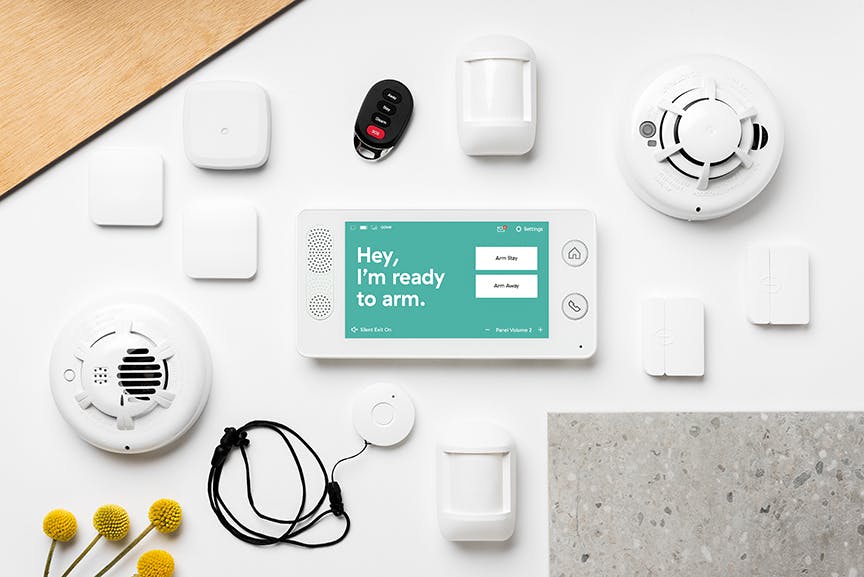
What Is the Best Modern Security System?
Answer: Cove offers the best modern security system.
Modern home security systems should include protection against burglary through professional and remote monitoring and protection against fires, floods, carbon monoxide, and medical emergencies. To find the best modern home security system for your home, you need to find a company that embodies these things and impresses you with their customer service, flexibility, and honesty. A modern home security system for your home should include:
1. Great Customer Reviews
The best modern security systems have great reviews from their customers. When a customer buys a security service, they can view the alarm company’s inner workings. If they love the customer service, the products, and the emergency service, they can leave a five-star review. However, if they had a poor experience, they can leave a one or two-star review. The reviews of a company reflect the ethics and beliefs of that company. This means that if the alarm company is overwhelmingly kind, considerate, and caring, they will have a higher rating than a company that tricks its customers into purchasing the products. Always look for a security service with higher than four stars.
2. Affordability
Although home security is important, you should never break your budget for a home security system, especially if the alarm service is higher than $40 a month. Instead, the service should be a healthy cost, which is between $15 a month and $35 a month. Having an alarm system that fits in your budget rather than stretching it is essential.
3. Transparency
Finally, your alarm company should be transparent. You should never feel tricked into purchasing your alarm. Your alarm should be something that you love and something that the alarm company has confidence in. Some of the best modern alarm companies offer free trials with their products and have no contracts, proving to their customers that they believe in the product. Those looking for reliable modern security should look for companies that trust their own products.
Cove offers the best home security products for the best price. Cove is a modern alarm company with professional and remote monitoring plans. The company also offers everything from home security to medical alert devices to ensure that every member of your home is thoroughly protected. Cove is your best option for modern security.
